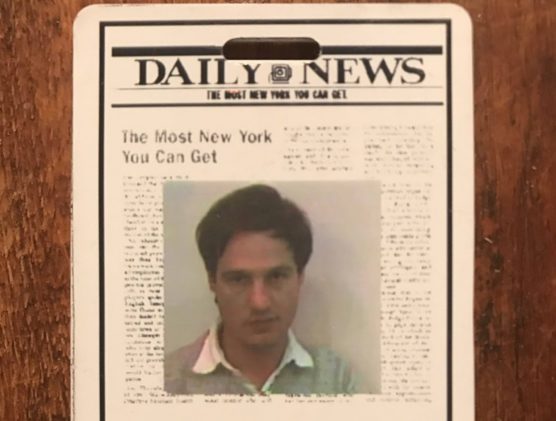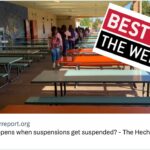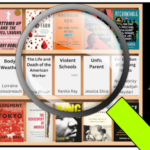The latest in a long line of NYC education reporters moving on to other things in recent years, former Daily News reporter Ben Chapman calls for more aggressive coverage and more focus on systemic issues that affect kids and families.
By Alexander Russo
After more than eight years covering the New York City schools for the New York Daily News, much-admired reporter Ben Chapman left the grueling beat last month.
It’s a massive beat, focused on a district that’s larger than any other in the nation. And, unlike many others, Chapman had come to the beat by accident, as a travel writer and journalism graduate student desperate for a journalism job in the middle of the Great Recession. He found a spot covering education in New York City, and he stayed longer than most.
Along the way, he wrote nearly 3,000 stories and experienced some dramatic moments. He got doxxed. He got mugged. And he won a bunch of awards. Now he’s one of several NYC education reporters to have moved on to other things, joining former NYC education reporters like New York 1’s Lindsey Christ, WNYC’s Yasmeen Kahn and Beth Fertig, and the New York Times’ Kate Taylor and Elizabeth Harris.
Three weeks into his new job writing about crime for the Wall Street Journal, Chapman sat down with The Grade to talk about his experiences and share his observations. Known as a particularly affable reporter, Chapman may surprise you with the strength of his views on coverage of New York City schools and education journalism in general. Maybe that’s why he thrived at a hard-charging tabloid.
As you’ll see, Chapman wants more journalism about kids and families and less about policies and politics. He wants more coverage of systematic inequality and less about elite schools that serve only a handful of students.
The following has been edited for clarity and length.
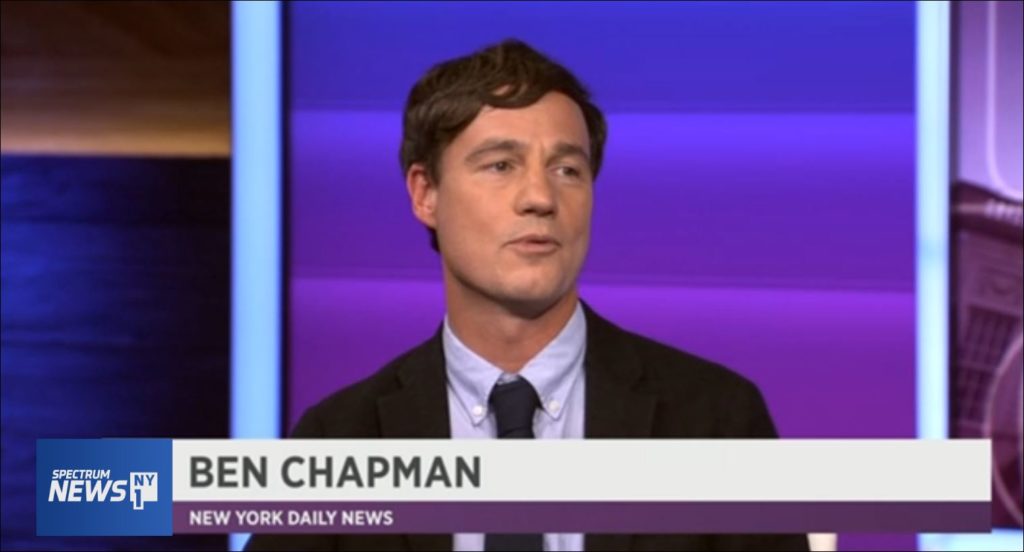
Chapman on a recent local cable news segment discussing NYC schools. You can watch it here.
What do you wish you’d known about covering education before you started?
BC: The beat always challenged me in terms of the complexity of the subject. It also pushed me on a technical and psychological level when it came to covering children. Parents were extremely protective. I needed to develop tools to gain their trust. I needed to figure how to get kids to open up. That’s important. Over the years, I often encountered young people who were suffering. I kept a professional distance, but that was always sad. People don’t talk about trauma in journalism enough. In my opinion, it should probably be taught in J-school like ethics are. Being mindful of all that makes one a stronger reporter.
What were some of the tools you developed to build trust and practice self-care?
BC: I tried to give a lot of myself to the stories and put a lot of time into building empathy and sensitivity, and I think people in the community responded to that with trust. I also take care to spell things out for sources so they feel knowledgeable about what’s happening in terms of the articles. That gives them confidence and agency and builds trust. After my son was born, I realized that I needed to take some proactive steps to deal with the stress generated by my work as a journalist. I talked with my mom who is a therapist and got a couple of book recommendations from her. From there, I just learned to employ basic stress-reduction techniques such as practicing some light meditation, getting exercise, and taking good care in terms of nutrition and sleep.
What was your biggest/proudest moment covering education?
BC: The greatest thing about covering schools for a local publication like the Daily News was that I really got to make an impact in my community. I wrote almost 3,000 stories for the News, and they probably prompted more changes in the school system than I know. That was the best thing about the job. I helped homeless kids get scholarships, got abusive educators removed from schools, and prompted significant policy changes. I think I helped make the system better in NYC. I also won some awards, which was nice. I kept a steady paycheck, too, and that was important.
What was your lowest/hardest moment?
BC: Covering the Sandy Hook mass shooting was one of the darkest assignments I had. I was one of the first reporters at the scene. We couldn’t get into the school, but people were coming out from there. I had to interview victims’ families. Another low point was when students and alumni from a school I wrote about started harassing my family and doxxed us. One of them got arrested. It was upsetting because I only ever wanted to help kids with my stories.
Sign up here for a free newsletter featuring the week’s best education news and newsroom comings and goings.
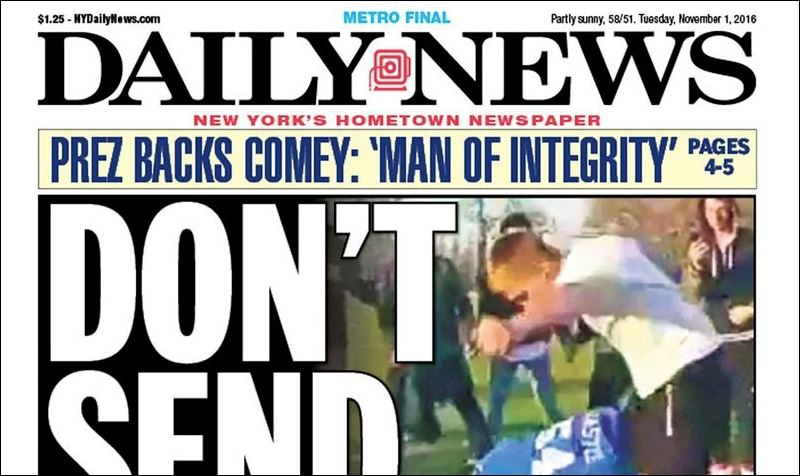
For a moment in 2016, Chapman became part of the story.
What are the advantages and disadvantages, writing for a tabloid news outlet?
BC: I found it to be a great fit for me on a lot of levels. They were really seeking to be the voice of the working person in this city. They also gave me the opportunity to publish a ton of stories, which is great practice. And the Daily News totally moved the needle in terms of policy decisions. The negatives were that it was extremely fast paced, and they wanted hard-hitting articles. So there was a lot of conflict baked into the job.
Who’ve been some of the NYC education reporters you’ve most admired/envied along the way, and why?
BC: Eliza Shapiro of the New York Times is super smart and has an exceptional gift for contextualizing the stories of the day in the bigger picture. Elizabeth Harris [who formerly covered the beat for the Times] was an uncommonly empathetic reporter when she was on the beat for the Times, and Kate Taylor [another former Times metro reporter] was a fierce schools reporter for the Times as well. Leslie Brody of the Wall Street Journal is maybe the fairest reporter I’ve ever met in my life. She is about as unbiased as a reporter can be. It’s inspiring. Yasmeen Khan and Beth Fertig of WNYC were great. The folks at the New York Post do good stories and Yoav Gonen was a very sharp reporter when he was there. Lindsey Christ was an incredibly sensitive and energetic reporter who was really generous and kind. The folks at Chalkbeat are doing good work too.
You’re really not going to pick a favorite, are you?
BC: It’s very hard for me to pick a favorite. I like them all for their different things.
To learn more about how the media covers education, follow The Grade on Twitter and Facebook.
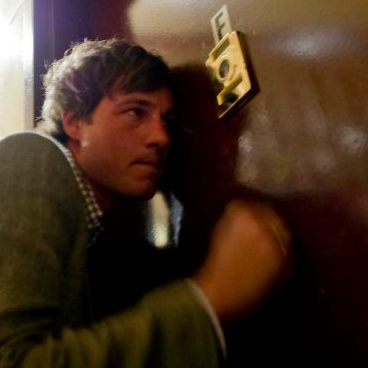
Chapman’s current Twitter picture shows him knocking on an apartment door.
Do you think the coverage of NYC schools is aggressive enough?
BC: I don’t think it’s anywhere near too aggressive. It’s not even close. If there were a critique of the overall media coverage in NYC it would be that on the whole it should be more aggressive. There are individual people who are aggressive and tough and accurate and smart, but the fact of the matter is that the school system in NYC is a tremendously important institution for the city and for the nation. So it deserves a very tough accounting. There are gigantic problems in the system here. Huge ones. And there’s not a ton of progress being made on the most important parts.
Why aren’t these gigantic problems getting the coverage they warrant?
BC: It’s very hard to execute critical coverage as a beat reporter. You have to be working with these people every day. Any criticism has to be airtight. They fight you on everything. So it’s a lot of work. It’s much easier to write pieces that are less critical than are more critical. When you write pieces that are critical, the stakeholders come back at you and tell you that you did it wrong. I felt like there was a team of people working to discredit my most critical articles. And there’s definitely a team of people working to massage the data and present the narrative that they want.
Charter schools, the SHSAT debate, segregation. Are any of these over-, under-, or mis-covered storylines?
BC: Those are all important topics deserving of attention. The high level of hostility and grandstanding around the segregation and SHSAT [Specialized High School Admissions Test] debate is a little wearisome and isn’t helping with consensus, which is a necessary ingredient in a public school system. To focus on those eight schools over and over again is like kind of, enough already.
What would you like to see more of instead?
BC: I’d like to see more focused on the bigger system. I’d like to see more of a focus on school quality and equity. The fact of the matter is that poor neighborhoods in New York are still being denied resources after all these years. The mayor and his officials are taking loudly, but I’d like to see more action and more critical reporting of the unequal situation in the city schools. If anything, I think the city could use more coverage of actual families and their experiences rather than the policy changes du jour or whatever political hot potato is in vogue.
Read previous profiles of Chapman and other New York City education reporters including Politico NY Reporter Tries to Thread the Needle (Eliza Shapiro), WNYC’s Beth Fertig Thinks Differently About Education Reporting — & It Shows, and Low-Key Reporter Thrives In High-Pressure NYC Environment (Chapman).
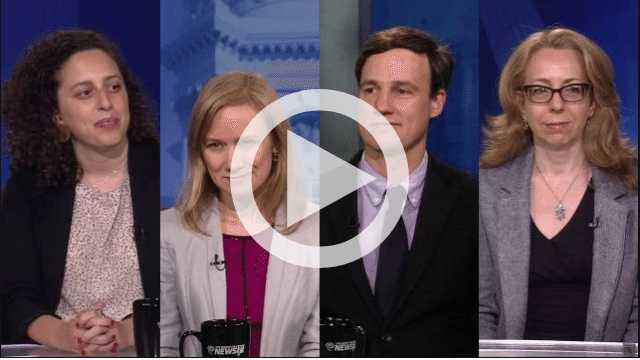
All but one of the four NYC education reporters (Eliza Shapiro, far left) on this 2016 local cable news segment has moved on to something else. Several others, including Yasmeen Khan and Lindsey Christ, are also no longer in place. Read more about the brain drain in education journalism here.
Nine years is a long time. What kept you at it for so long?
BC: It was always changing and always challenging. The competition on the education beat in New York is always stiff, and that’s fun. But most importantly, covering schools gave me the opportunity to keep publishing and keep making a difference in the city. I think it’s also worth noting that, in addition to helping out society through reporting on a critical issue, education reporters also enjoy a relatively high level of job security. That counts for something too.
Why did you decide to leave now?
BC: I could’ve spent my entire career writing about the schools in New York City. Even with the thousands of stories that I did, I feel like I only scratched the surface. But sometimes in life it’s hard to figure out if you’ve found your niche or if you’re just too comfortable.
For me, part of it was that sort of like we’re in a little bit of a flat spot in NYC education news right now. Mayor de Blasio did his first term stuff, now he’s in his second term, and it doesn’t really feel like there are any gigantic ideas that are in the offing. The city government is facing budgetary restrictions. It felt like a good time for me to go.
RELATED POSTS
Chalkbeat adds a new focus on storytelling to its ongoing expansion
ABOUT THE AUTHOR

Alexander Russo
Alexander Russo is founder and editor of The Grade, an award-winning effort to help improve media coverage of education issues. He’s also a Spencer Education Journalism Fellowship winner and a book author. You can reach him at @alexanderrusso.
Visit their website at: https://the-grade.org/

